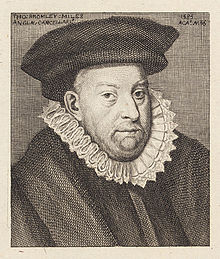Sir Thomas Bromley
|
The Right Honourable Sir Thomas Bromley |
|
|---|---|
 |
|
| Solicitor General | |
|
In office 1569–1579 |
|
| Lord Chancellor | |
|
In office 1579–1587 |
|
| Chancellor of the University of Oxford | |
|
In office 1585–1587 |
|
| Personal details | |
| Born | 1530 |
| Died | 11 April 1587 (aged 57) |
| Resting place | Westminster Abbey, London |
| Nationality | English |
| Spouse(s) | Elizabeth Fortescue |
| Alma mater | University of Oxford |
Sir Thomas Bromley (1530 – 11 April 1587) was a 16th-century lawyer, judge and politician who established himself in the mid-Tudor period and rose to prominence during the reign of Elizabeth I. He was successively Solicitor General and Lord Chancellor of England. He presided over the trial of Mary, Queen of Scots and died three months after her execution.
Thomas Bromley was born around 1530. He was the second son of
The Bromleys originated in Staffordshire, but had acquired estates in neighbouring counties. They were of the middling landed gentry, like their allies and neighbours the Hills: the two families were to prosper together by seeking new sources of income, the Hills from commerce and the Bromleys through the law. George Bromley was a prominent member of the Inner Temple, serving as Autumn Reader for 1508 and Lent Reader for 1509, although he refused the honour for Lent 1515. Another Thomas Bromley, George's younger cousin, was made Chief Justice of the King’s Bench by Mary I. The young Thomas Bromley also had an elder brother, another George Bromley, the heir to the family estates, who was himself to become a notable lawyer and politician.
The family tree illustrates Thomas Bromley's relationship to the rest of the Bromley dynasty and to their main allies, the Hill, Corbet and Newport families.
Based primarily on the Heraldic Visitations of Shropshire and Cheshire, with assistance from the History of Parliament Online.
Both Thomas Bromley and his elder brother, George, were trained in law and called to the bar at the Inner Temple. By 1555, Thomas had gained some trust and prestige at his Inn of Court and was appointed as one of the auditors of the steward. In that year his namesake, the chief justice, died, bequeathing the young Thomas an allowance of 40 shillings a year for ten years, on condition he continue his legal studies. This he clearly did, as he received the degree of Bachelor of Civil Law from Oxford University in 1560 He also rose at his Inn: by February 1563 he was a member of the parliament of the Inner Temple, like his brother George. In 1565 he was appointed attendant on the Reader for the first time, accompanying Richard Onslow, a contemporary from Shropshire who often officiated with him.
...
Wikipedia
